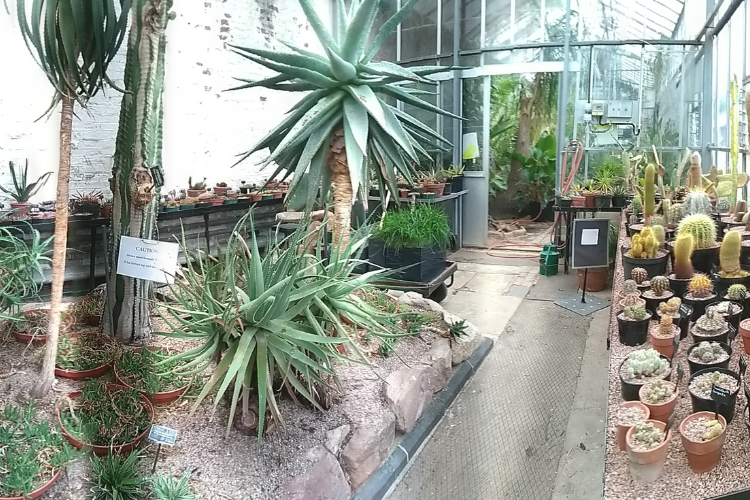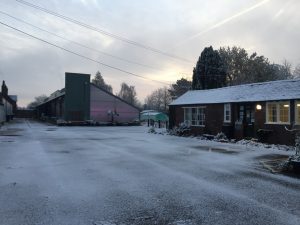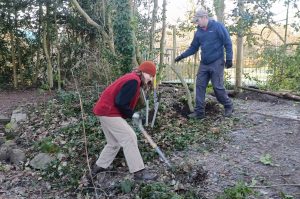
Something ‘Fir’ Everyone: The Firs Botanical Grounds and Environmental Research Station
Blog by Rachel Grunnill, Botanical Garden Project Development Officer.
In the heart of the University’s Fallowfield campus sits the Firs Botanical Grounds and Environmental Research Station. This urban oasis is home to vital environmental research, teaching, wellbeing activities and community outreach. As one of the many green spaces on campus, the Firs is a key part of the University’s Environmental Sustainability Strategy, helping deliver on commitments to improving biodiversity, urban green space coverage and green wellbeing outcomes, as well as integrating learning and teaching with our estate’s biodiversity.
 The Firs is home to a new state of the art research greenhouse facility, conducting research on issues from food insecurity to climate change; The Manchester Air Quality Super Site which gathers detailed data on urban air pollution, and the Range Greenhouse, Moss house and surrounding gardens are made up of various themed biomes and plantings, containing the University’s Living Plant Collection. The site provides controlled indoor as well as outdoor spaces for research, teaching and outreach activities from across all faculties of the University. Classes can be taught using the living plant collection, in the gardens or marquee.
The Firs is home to a new state of the art research greenhouse facility, conducting research on issues from food insecurity to climate change; The Manchester Air Quality Super Site which gathers detailed data on urban air pollution, and the Range Greenhouse, Moss house and surrounding gardens are made up of various themed biomes and plantings, containing the University’s Living Plant Collection. The site provides controlled indoor as well as outdoor spaces for research, teaching and outreach activities from across all faculties of the University. Classes can be taught using the living plant collection, in the gardens or marquee.
Each year, students from Biological Sciences and Earth and Environmental Sciences visit the living plant collection to learn about the evolution of plants, from the most ancient mosses and liverworts, through to recently evolved and highly adapted groups, such as those in our extensive succulent collection.
In addition to scientific research, the Firs has been used as inspiration for arts students, including poetry workshops and music ensembles. An extensive archive of historical records has formed the basis for history research projects.
 The site regularly hosts student projects in degrees ranging from architecture to zoology. These can use assigned greenhouse space, the poly tunnel or outdoor areas and staff on site are able to provide safety inductions and give advice and support in the setting up and running of experiments. Work experience can also be arranged as part of the Student Experience Internships.
The site regularly hosts student projects in degrees ranging from architecture to zoology. These can use assigned greenhouse space, the poly tunnel or outdoor areas and staff on site are able to provide safety inductions and give advice and support in the setting up and running of experiments. Work experience can also be arranged as part of the Student Experience Internships.
The Firs also offers a range of wellbeing activities for our University community. Staff can organise away days at the Firs, in which they can work on team-building exercises or enjoy the benefits of green spaces through a tour of the site. Students can get involved in various volunteering opportunities at the Firs, all of which can be found through Volunteer Hub. Additionally, the Green Wellbeing Project is offered as part of the student counselling social prescribing options, allowing students a place to connect with others in nature, promoting social support and wellbeing.
If you are interested in using the Firs for your teaching, wellbeing or any other activities, please contact firs@manchester.ac.uk
Learn more about the Firs on their website.
The content discussed in this article aligns with United Nations Sustainable Development Goals: Quality education (4), Sustainable cities and communities (11), Climate action (13), Life of land (15) and Partnerships for the goals (17).
Sign up to receive the FBMH ES newsletter by contacting srbmh@manchester.ac.uk. Read our previous editions: June and October 2023
To find out more about Environmental Sustainability: visit the Faculty’s intranet page, website or contact srbmh@manchester.ac.uk . For more information on Environmental Sustainability at the University watch this short film or visit their website.

0 Comments